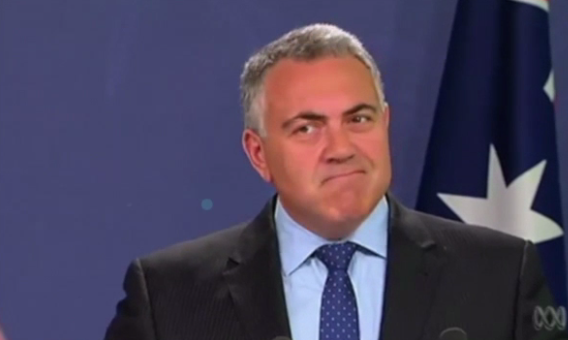Clean energy corporations have welcomed the passage through Parliament of a renewable energy target, even though it has been cut from 41,000 to 33,000 gigawatt hours.
Pope Francis and Admiral Chris Barrie may be behind the wind and solar companies, but they would also be helped by a tax system that encourages rather than impedes wealth-creating long-term investment.
Clean energy companies, and all others who invest in transforming our economy to cope with coming competitive challenges, would be helped by restoration of capital gains tax (CGT) rules that Treasurer Peter Costello discarded in 1999.
Many commentators, particularly those on the “left”, rightly criticise the government for giving a 50 per cent tax discount on capital gains, but the story is a little more complex.
Until 1985 Australia had no effective taxes on capital gains. In a major set of tax reforms the Hawke-Keating Government introduced an effective CGT regime with two important provisions. One was that CGT was assessed only on the real (inflation-adjusted) component of capital gains: illusory gains resulting from inflation were not taxed. The other was protection against a large and once-off capital gain pushing a taxpayer into a high tax bracket.
That system came as close as practicable to perfect neutrality between income from corporate dividends and income from capital gains.
That was to change in 1999, when in the name of encouraging “financial dynamism” (bankers’ code for irresponsible speculation), John Howard’s friend John Ralph convinced Treasurer Peter Costello that the CGT system needed changing.
As is well known, that change meant that the CGT for assets held for more than a year is now based on only half the gain.
The other big and less publicised change was removal of indexation. From 1999 onwards CGT has been applied not only to the real gain, but also to the inflationary component. To illustrate, if someone invests $100 in a company’s shares, and three years later sells those shares for $150, over which time inflation has been 10 per cent (a typical three year inflation figure), under the old system the base would have been indexed upwards to $110 and CGT would have been levied on a real profit of $40. Under Ralph-Costello new system CGT is levied on half of $50, or $25.
That’s the usual way the Ralph-Costello changes to CGT are viewed, as a big gain for investors.
But consider that same $100 invested by a patient investor with a long time horizon – perhaps as a shareholder in a private company. If, after 30 years, that company had not increased in real value, which is the case for many stable enterprises, on realisation the investor would not have incurred any CGT under the old system. But with three per cent annual inflation its nominal value would have increased to $242 (100 x 1.0330), and tax would be applied on $71, being half the nominal gain of $142.
The Ralph-Costello changes tipped the scales in favour of short-term speculators, and against the interests of those who were in it for the long haul. Costello was sold the idea on the basis that the old system was too complicated – it seems that he found year 6 mathematics a little too complex.
The members of the Ralph Committee, which included Westpac boss Bob Joss, certainly knew their mathematics. A system favouring short-term over long-term investment means more commissions for stockbrokers and other coupon clippers, and more money sloshing into and out of bank accounts. A triumph of the paper economy over the real economy.
In the early 2000s Peter Martin and I were among those who warned of the consequences of the Ralph changes, particularly in relation to housing, but people were too busy making profits on negatively-geared property to read such killjoy material.
The experience of 2008 should have made clear the consequences of “financial dynamism” and of policies that encourage short-term impression management over long-term wealth creation, but we don’t seem to have learned from the GFC.
In yet another call to sanity Black Rock CEO Larry Fink has written to more than 500 of America’s largest companies warning them to resist pressures “to meet short-term financial goals at the expense of building long-term value”, and calling on governments “to address public policy that fosters long-term behaviour”. He suggests that rates of CGT should fall, the longer the investment – the very opposite to the system Costello loaded on to us.
But our government isn’t listening. The government’s tax discussion paper doesn’t acknowledge the disincentive effect of non-indexation of CGT – instead it repeats the idea that indexation carried “complexity” and a “compliance burden”, implying that Hockey, like Costello, also struggles with high school mathematics.

An alternative explanation, crediting Hockey with a modicum of mathematical understanding, is that the government knows perfectly well that its policies favour the financial sector over the real economy. Since coming to office they have sought to shore up the financial sector’s sense of entitlement, so shamelessly demonstrated in their attempts to unwind the previous government’s reforms to financial salespeople’s commissions.
Now the government seems to be offended that industry superannuation funds are providing their investors with high returns rather than siphoning off members’ earnings into fees and commissions for the financial sector.
It would be comforting to think that our next round of capital spending would be real investment in renewable energy as we belatedly catch up with other developed countries. But it seems that Hockey and Abbott, with their finely tuned aesthetic taste, find something attractive in insurers’ and bankers’ office towers that they don’t find in wind and solar farms.
Donate To New Matilda
New Matilda is a small, independent media outlet. We survive through reader contributions, and never losing a lawsuit. If you got something from this article, giving something back helps us to continue speaking truth to power. Every little bit counts.




